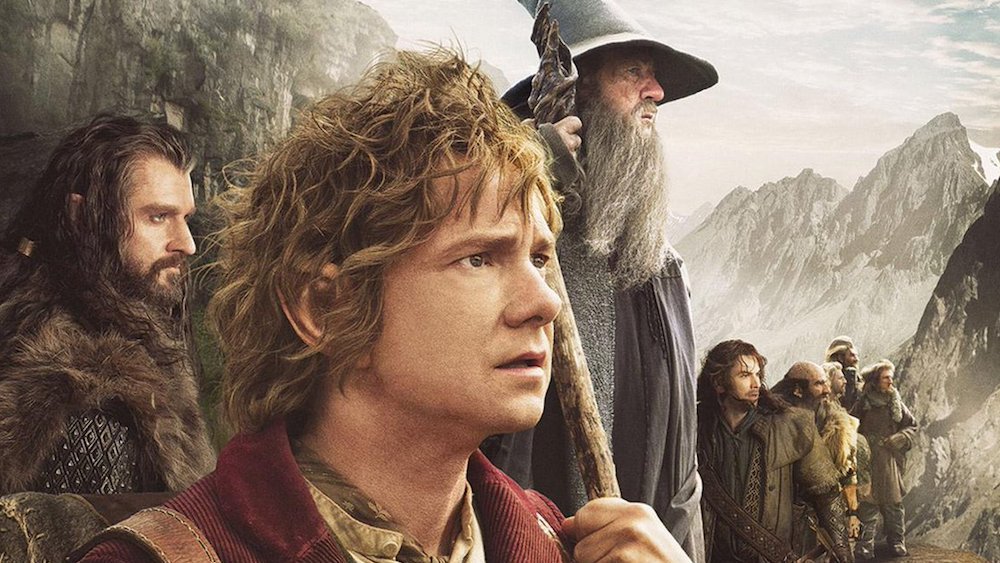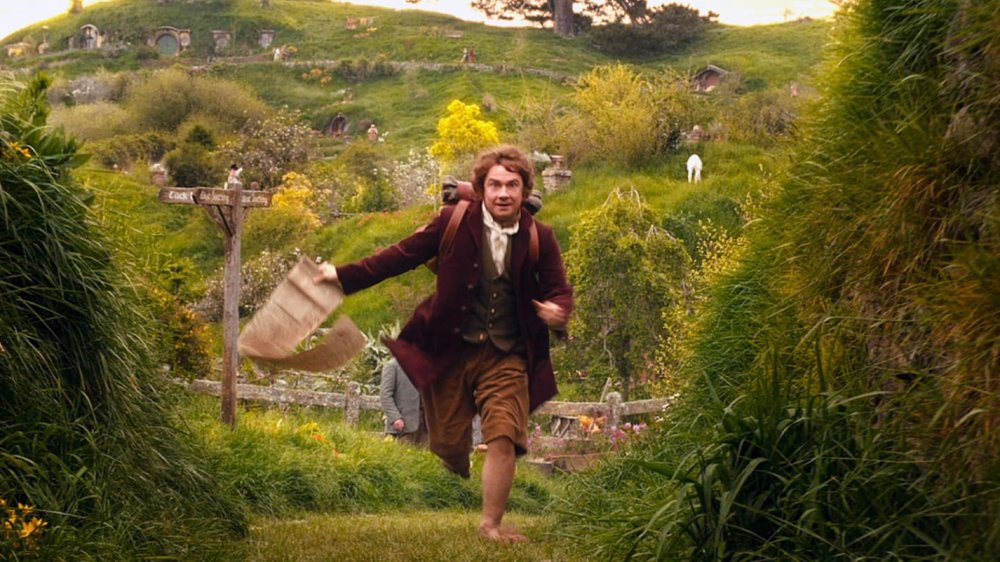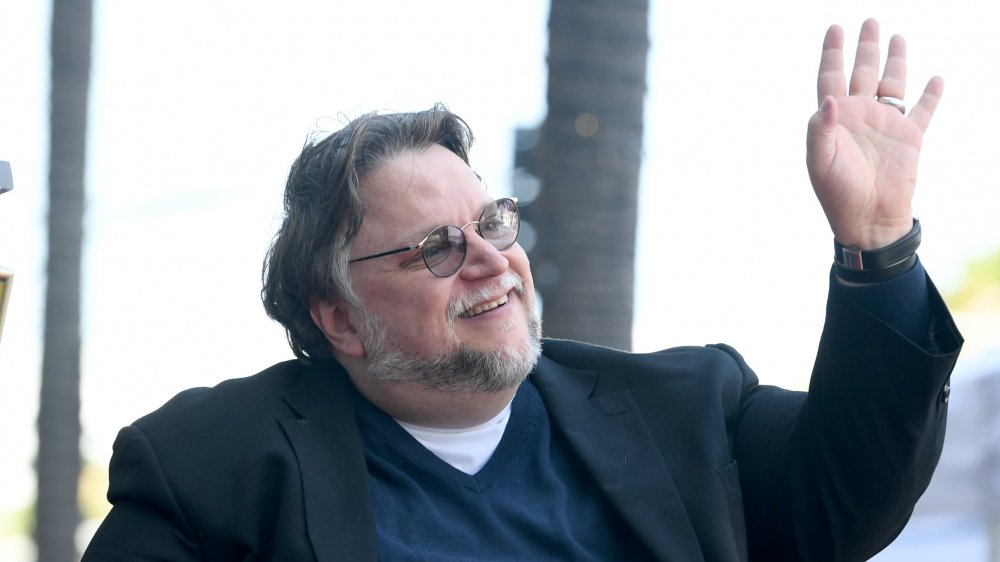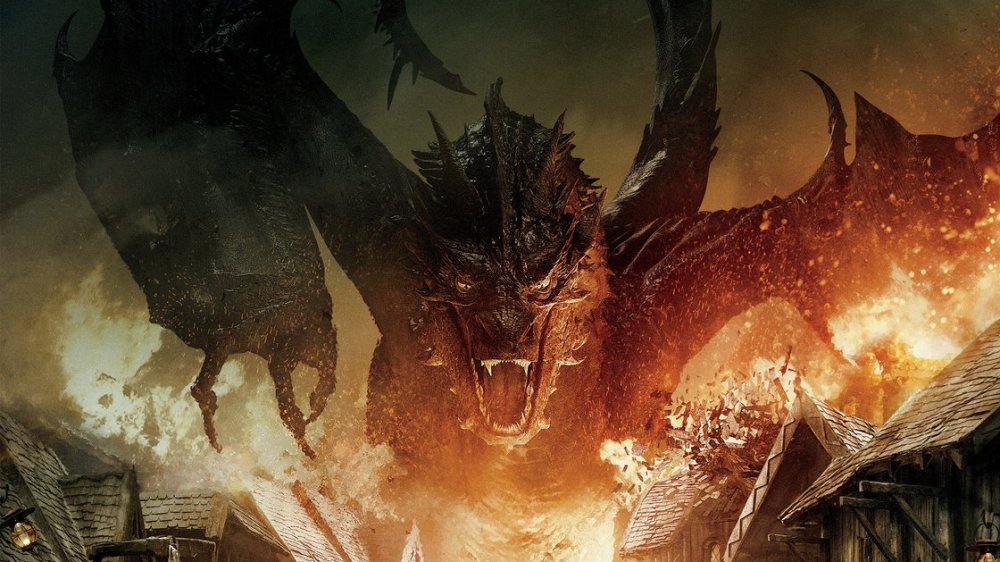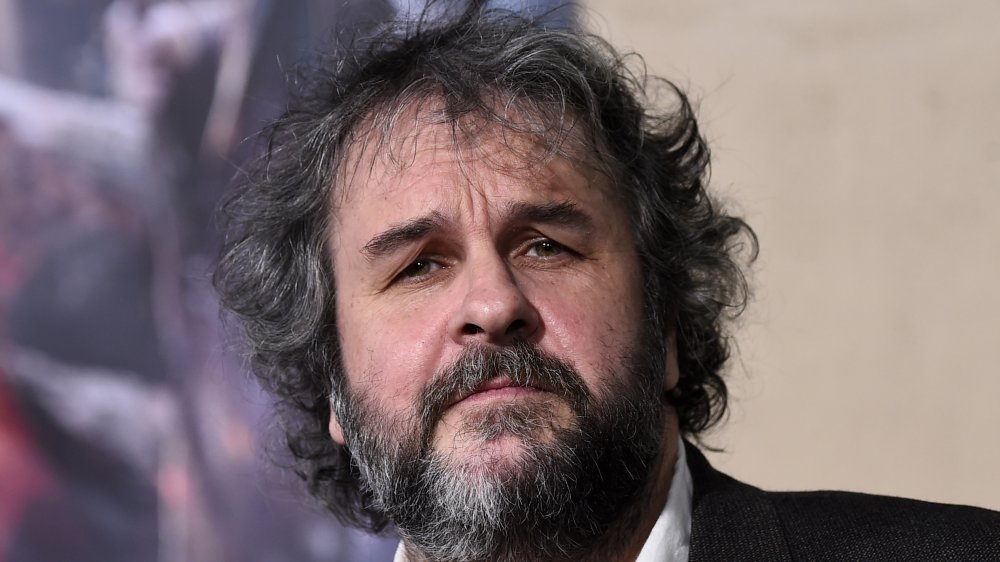The Real Reason Guillermo Del Toro Didn't Direct The Hobbit Trilogy
Peter Jackson's Lord of the Rings trilogy, based on J.R.R. Tolkien's iconic fantasy series, are among the most ambitious films ever made. Shot simultaneously over the course of more than a year beginning in late 1999, the trilogy sported a then-staggering budget of nearly $300 million, and the films represented a considerable risk for studio New Line. That risk paid off: the movies are revered by Tolkien's fans, and they won a truckload of Academy Awards while grossing over $3 billion at the worldwide box office.
In the wake of that success, New Line — in association with MGM — set out to capitalize. Jackson had originally intended to include Tolkien's prequel novella, The Hobbit, in his original film trilogy, but couldn't do so due to the rights being tied up. Those issues were eventually resolved, and plans began to take shape to adapt The Hobbit for the screen; Jackson, however, wasn't keen to direct, desiring only to write and produce what was then planned to be two features.
Enter the great Guillermo del Toro, with whom Jackson was friendly; the pair had previously worked together on a failed big-screen adaptation of the Halo video game series. In April 2008, del Toro was officially hired to direct the Hobbit films, which he would co-write with Jackson and his Lord of the Rings collaborators Fran Walsh and Philippa Boyens. Publicly, the director assured fans that everything was on course for the next two years — but in May 2010, del Toro departed the project, leaving Jackson to eventually (and reluctantly) take the reins.
Fans have always wondered what circumstances led to del Toro's departure, and while it wasn't just one thing, there was a breaking point. Here's the real reason Guillermo del Toro didn't direct the Hobbit trilogy.
Trouble began brewing early for the Hobbit movies
The first signs of trouble showed up in November 2008, as it became apparent that del Toro and Jackson had a bit more in mind than simply a straight adaptation of Tolkien's famously slight work. As the screenwriting team worked on the story, new wrinkles kept presenting themselves — and, as del Toro told ComingSoon.net at that time, the script wrangling was throwing a wrench into other crucial aspects of the production, such as casting.
"Literally, like every week, what you discover writing the two movies, writing the two stories, it changes," del Toro explained. "So, every week there's a discovery, and anything we say this week [might] be contradicted next week. Certainly that would be true in casting. Why create hopes or why create expectations if down the line you're going to go, 'You know what? That was not a good idea.'"
Filming was slated to begin in early 2010, but by late 2009, it became obvious that this wasn't going to happen. GamesRadar reported at the time that Jackson had begun floating a more pessimistic estimate of mid-2010 for production to begin, and with the writing of the screenplays still ongoing, two things had yet to happen: the pictures still hadn't been cast, and with no budget estimate in place, MGM and New Line hadn't actually given the films the official green light.
At this point, the previously announced release frames of 2011 and 2012 had gone out the window, with the first film being having been pushed back to 2012. When the films hadn't made their way before the cameras by May 2010, it became apparent just how serious the productions' problems really were.
Guillermo del Toro's expanded commitment forced him to depart the Hobbit movies
That same month, del Toro publicly vented his frustration. In a May 28, 2010 interview with Shock Till You Drop, he indicated that writing had finally been completed — along with various aspects of the productions' design, including animatics — but at that point, MGM's legendary financial troubles were coming into play. "There can't be any start date, really, until the MGM situation gets resolved," del Toro said. "Whether they stay and get supported or they get bought or they transfer some of the rights, nobody knows... we are very, very prepared for when it's finally triggered, but we don't know anything until MGM is solved."
Unfortunately, in the couple days that followed — with it becoming clear that work on the Hobbit films would be eating up several more years — del Toro decided that he'd had enough. On May 30, 2010, it was announced that he was leaving the project. "In light of ongoing delays in the setting of a start date for filming The Hobbit, I am faced with the hardest decision of my life," the director told fan site The One Ring. "I remain an ally to it and its makers, present and future, and fully support a smooth transition to a new director."
Jackson assured fans that del Toro would continue to help fine-tune the screenplays, and that — notably — he did "not anticipate any delay or disruption to ongoing pre-production work." He also indicated that the search for a new director was underway... a search which would eventually, of course, land on Jackson himself.
Guillermo del Toro's version of the Hobbit movies would have been very different
Had del Toro not departed the Hobbit movies, it's certain that they would have been very different films from the ones that made it to the screen. From the beginning, del Toro envisioned the pictures' tone changing throughout, beginning with a lighter, more fairytale-like aesthetic before morphing to eventually match the tone of Jackson's original trilogy.
In a 2008 interview with Yahoo!, del Toro explained this in depth. "The first film will stand on its own, and the second will be a transition and fusion with Peter's world," he said. "I plan to change and expand the visuals from Peter's, and I know the world can be portrayed in a different way. Different is better for the first one. For the second, I have the responsibility of finding a slow progression, and mimicking the style of Peter."
Obviously, this concept didn't stick when del Toro left — and after his departure, by all accounts, the creative wheels started to come off. Significantly, the production schedule wasn't adjusted to accommodate a new director being brought on board; the names being bandied about — David Yates, David Dobkin, and even Brett Ratner — didn't say "auteur" so much as they said "hired gun."
As early as June 2010, though, it was being reported that Jackson was under pressure from MGM and New Line to take over. In October of that year, his ascension to the director's chair was made official. Fans had every reason to believe that the Hobbit films were in capable hands, even when Jackson announced just months before the first flick's release that, actually, the duology would be a trilogy. But despite his public confidence, in private, Jackson was struggling mightily.
Peter Jackson has never been satisfied with his version of the Hobbit movies
It's no secret that the Hobbit movies — 2012's An Unexpected Journey, 2013's The Desolation of Smaug, and 2014's The Battle of the Five Armies — weren't wonderfully received by the Lord of the Rings fandom. Perhaps if Jackson had simply developed the films himself from the beginning, they wouldn't have been such a mess — but del Toro's departure left Jackson tasked with completing a vision that wasn't exactly his, and one which he felt ill-equipped to pull off.
In 2015, Jackson explained on a behind-the-scenes featurette on the Battle of the Five Armies DVD that MGM and New Line's failure to adjust the production schedule left him with a time crunch that he was in no way prepared for. "I didn't know what the hell I was doing," Jackson stated bluntly (via IndieWire). "Because Guillermo del Toro had to leave and I jumped in and took over, we didn't wind the clock back a year and a half and give me a year and a half prep to design the movie, which was different to what he was doing."
As a result, Jackson went on to say that he basically just had to shoot his insanely expensive, epic trilogy on the fly. "It was impossible, and as a result of it being impossible I just started shooting the movie with most of it not prepped at all," he said (via Slashfilm). "You're going on to a set and you're winging it, you've got these massively complicated scenes, no storyboards, and you're making it up there and then on the spot."
It's an unfortunate and complicated set of circumstances that led to del Toro's vision for The Hobbit never coming to fruition — but at least fans will always have Jackson's original Lord of the Rings films, one of the greatest cinematic trilogies of all time.
